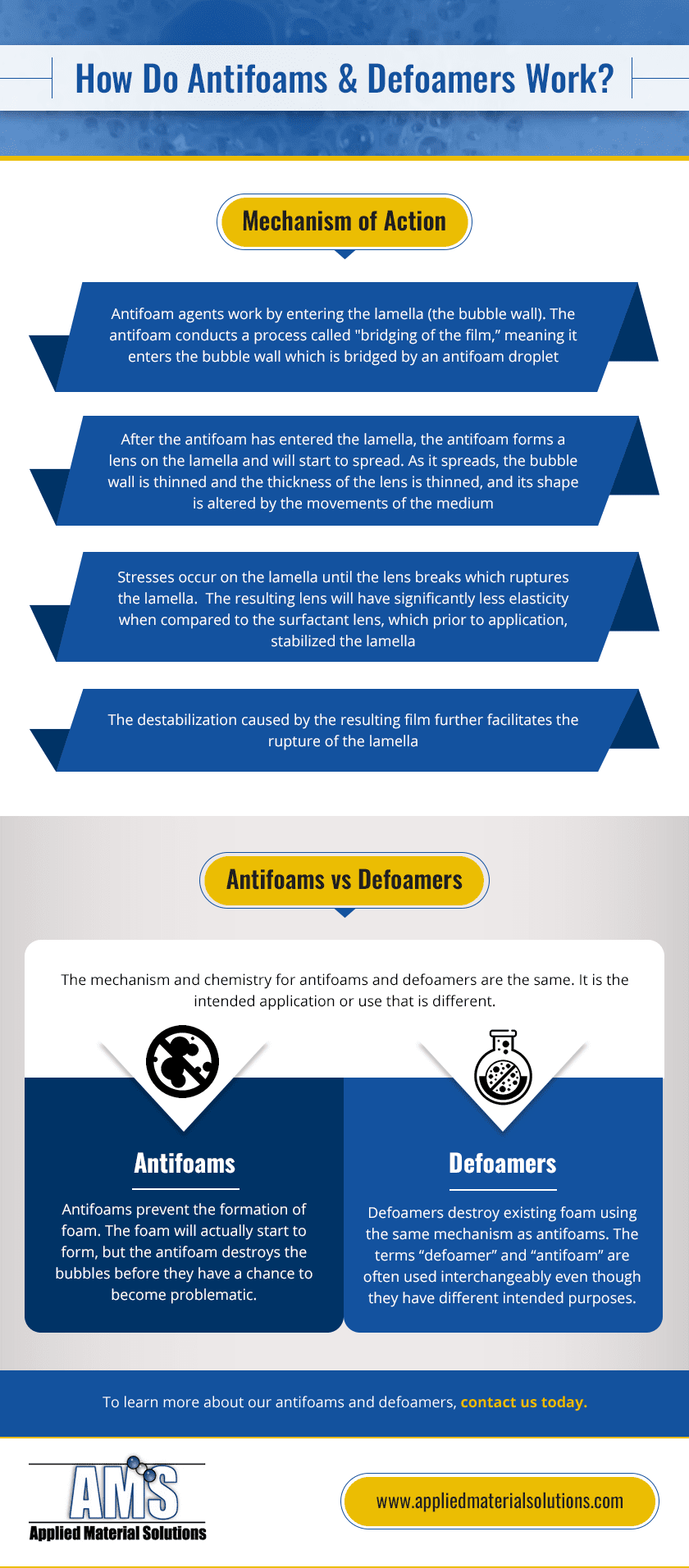How Defoamers Improve Product Quality and Reduce Waste in Production
How Defoamers Improve Product Quality and Reduce Waste in Production
Blog Article
The Role of Defoamers in Enhancing Product Quality and Efficiency
Defoamers offer as vital ingredients that mitigate this problem, guaranteeing smoother production process while enhancing the practical and aesthetic characteristics of the last products. The choice of the suitable defoamer can be crucial to attaining optimum results, increasing essential questions regarding formula compatibility and performance metrics that merit more expedition.
Recognizing Defoamers
Recognizing the role of defoamers is necessary for keeping item high quality across numerous markets. Defoamers are chemical ingredients designed to reduce and stop the formation of foam in liquid systems, which can negatively impact procedures such as mixing, loading, and surface stress. Lathering can cause ineffectiveness, item defects, and endangered visual appeal, making defoamers a vital part in making operations.
In industrial applications, defoamers assist to improve item uniformity and security. The effective use of defoamers not just ensures smoother production procedures yet also contributes to exceptional item performance.
Moreover, the option and solution of a defoamer need to line up with particular application needs, such as compatibility with various other ingredients, effectiveness under varying temperature and pH conditions, and prospective regulatory restraints. Inevitably, recognizing defoamers' features and their value in various formulations is crucial for enhancing manufacturing and making certain the best quality end products.
Sorts Of Defoamers
Defoamers can be categorized into numerous types based on their structure and system of action. The main kinds include silicone-based, non-silicone natural, and not natural defoamers.
Silicone-based defoamers are among one of the most effective, mostly as a result of their ability to spread promptly on the liquid surface and interrupt foam development. Their one-of-a-kind chemical structure permits superior stability, making them appropriate for high-temperature applications and environments with varying pH levels.
Non-silicone organic defoamers, typically composed of fatty acids or all-natural oils, are valued for their biodegradability and lower poisoning. These are usually utilized in food and beverage applications where security and environmental effect are extremely important.
Not natural defoamers, that include materials like talc or calcium carbonate, act by raising the thickness of the fluid, consequently minimizing foam security. They are frequently utilized in commercial procedures where compatibility with various other materials is not a problem.
Each kind of defoamer has unique advantages and restrictions, enabling for tailored solutions depending on the details foaming issues run into in various applications. Understanding these differences is crucial for maximizing performance and achieving wanted item top quality.
Applications Across Industries
Numerous markets leverage defoamers to improve product high quality and functional effectiveness. In the food and drink industry, defoamers are essential in processes such as developing and milk manufacturing to prevent foam development, which can bring about ineffectiveness and item disparity. By regulating foam, makers can make certain better yield and a more consistent product.
In the pharmaceutical industry, defoamers play an essential duty in the formulation of fluid drugs, where excessive foam can impede mixing and accurate dosing. Their usage helps preserve the honesty of the solutions and facilitates smoother production procedures.
The paint and finishings market likewise relies upon defoamers to boost the efficiency of items throughout application. By decreasing foam, these additives make certain a smoother coating and boost the aesthetic qualities of the final item.

Benefits of Utilizing Defoamers
While the application of defoamers varies across industries, their benefits continually boost item quality and process effectiveness. One substantial benefit is the reduction of foam formation throughout making processes, which can otherwise result in manufacturing delays and variances in product top quality. By decreasing foam, defoamers make it possible for a smoother flow of materials, facilitating much more reliable operations and decreasing the chance of devices breakdowns.
Furthermore, using defoamers can boost the look and appearance of end products. In fields such as coverings, paints, and food processing, too much foam can endanger the aesthetic aesthetic appeals and general high quality, while the ideal defoamer application makes certain a consistent coating and desirable features. Defoamers can add to set you back financial savings by lowering waste during manufacturing and optimizing the usage of raw materials.
.png?width=250&height=140&name=35722%20BOR%20Defoamers%20Ad_V8-BACKGROUND%20(2).png)
Choosing the Right Defoamer
Selecting the ideal defoamer is essential for maximizing manufacturing procedures and making sure item high quality. The selection of defoamer affects not just the efficiency of foam control however additionally the overall efficiency qualities of the end product. Aspects to take into consideration include the kind of application, the chemistry of the formulation, and the ecological conditions under which the item will certainly be used.
Various industries may require certain defoamer kinds, such as silicone-based, natural, or polymeric defoamers. Comprehending the compatibility of the defoamer with the main ingredients is vital to prevent adverse reactions that could endanger item integrity. In addition, the defoamer's performance in different temperature levels and pH levels have have a peek at these guys to be examined to guarantee constant efficiency.
Evaluating the defoamer in small-scale applications can give valuable understandings right into its efficiency and suitability. Consideration of regulative conformity, particularly in food, pharmaceuticals, and cosmetics, is critical in picking a defoamer. Eventually, a thorough assessment of these factors will certainly bring about the selection of a defoamer that not only manages foam successfully yet additionally enhances the top quality and performance of the end product.
Verdict

Finally, defoamers are important ingredients that considerably improve item quality and performance throughout various sectors. By effectively lowering foam formation, these agents not just improve functional efficiency however additionally add to the practical and aesthetic stability of items. The tactical choice and application of defoamers cause set you back savings, optimized source usage, and raised customer contentment. On the whole, the importance of defoamers in commercial procedures can not be overemphasized, as they play an important function in accomplishing consistent and top notch end results.
Foaming can lead to ineffectiveness, like it product defects, and endangered aesthetic allure, making defoamers an essential part in producing procedures.

Report this page